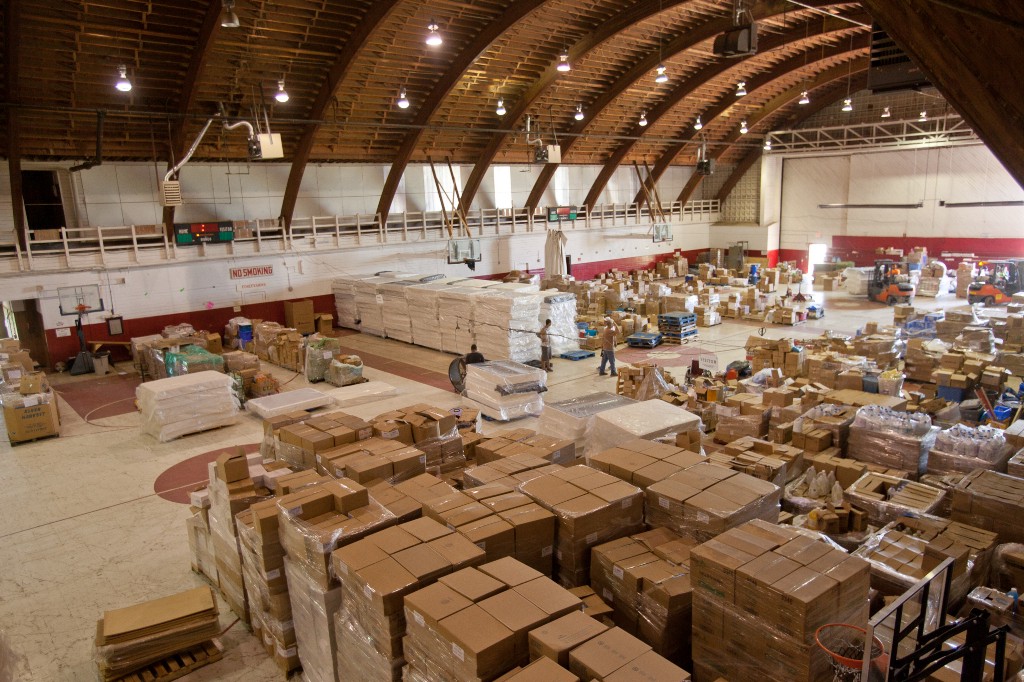Greetings, ImpactAlpha readers!
#Featured: Open Mic
Move over Fortune 500. Here come the B Corp 846. New Belgium Brewing Co., in Fort Collins, Colo., is employee-owned, wind-powered and now selling its brew in all 50 states. Its Fat Tire beer may be among the best in the world, but it made B Lab’s annual list for being among the best for the world. The 2017 Best for the World list recognizes the 846 best “B Corps” from 52 industries and 30 countries, ranging from small companies to pre-IPO unicorns (think Warby Parker) and multibillion-dollar publicly traded companies. “These companies prove that there is a viable alternative to business as usual,” writes B-Lab co-founder Jay Coen Gilbert on ImpactAlpha.
The annual list reflects the culture shift underway in business. The new elements of success: Purpose-driven. Good jobs. Environmental stewardship. Public accountability. And, of course, financial success. B Lab, a nonprofit, attempts to hold such businesses accountable with its B Corp certification, which attests to firms’ social and environmental performance and transparency. The black-and-white encircled “B” signals a company is among more than 2,200 B Corp-certified companies around the world. “With the rise of populist anger at a system that feels rigged, people are hungry for businesses that are changing the system,” Coen Gilbert writes. “The world needs social unicorns who, instead of aiming to hit $1 billion, reach to touch one billion lives.”
Read all about them in, “The most important list of businesses in the world,” by B-Lab’s Jay Coen Gilbert on ImpactAlpha:
The most important list of businesses in the world
#ICYMI: Brief Highlights
What Alaska’s oil dividend can teach us about Universal Basic Income. Every October, any man, woman, or child who has lived in Alaska for at least a year receives a “no strings attached” payment of between $1,000 and 2,000. A new survey shows nearly all Alaskans use the dividend for essentials, emergencies, or for future needs, such as retirement or education and at least one in 10 said the dividend made them more likely to take risks, learn new skills, or start new businesses. Is the Alaska Permanent Fund a model for Universal Basic Income? (Read more)
What Alaska’s oil dividend can teach us about Universal Basic Income
Ross Baird’s ode to the American Dream. Rather than living in the golden age of entrepreneurship, we are in the midst of a 40-year low in the rate of new business starts. In his new book, Village Capital founder Ross Baird blames investor blind spots that limit where, and to who, capital is flowing — and hurt job-creation and community health. His thesis: “If we are open and transparent about biases that influence our decisions, we’ll improve the diversity of ideas, and entrepreneurs, that get a shot — and the results of our investments.” (Read more)
Innovation Blind Spot: Ross Baird on bridging the entrepreneurial gaps that divide the U.S.
The impact data flywheel starts to spin. As investors demand impact financing and performance data, the marketplace is responding. In the finale of our Operation Impact series, produced in partnership with the Case Foundation, Acumen and Bridges Fund Management, David Bank reports that impact data “network effects” are kicking in. Along with many other data efforts, ImpactAlpha and our open database, ImpactSpace, are pulling together more data, which drive better products, which attract more users — and more data. (Read more)
Open Daily: The impact data flywheel starts to spin
#Dealflow: Follow the Money
Rise Fund invests in Dharma to simplify data management during crises. The data platform is already used by responders to medical crises in Iraq, hurricanes Harvey and Irma, and the humanitarian disaster in Syria. Dharma’s software-as-a-service technology simplifies the real-time collection, management, analysis, and visualization of data. The platform, “revolutionizes the way humanitarian and public sector organizations respond to areas of conflict, disaster relief, and infectious disease outbreaks,” says Larry Brilliant, former head Google.org, who recently joined Dharma’s board. The $14.2 million investment (according to an SEC filing) marks the fourth for TPG Growth’s Rise Fund, which has also backed edtech firm EverFi, Indian dairy company Dodla Dairy, household smart-device maker Brava. Rise Fund’s Bill McGlashan said mobile technology, data and analytics have the power to transform frontline efforts not only at humanitarian organizations but also in “healthcare, education, water and sanitation, and related supply chains.”
Guild Education raises $21 million to help wage workers pay for higher education. The Denver-based company partners with large companies and universities to offer hourly workers education benefits and tuition reimbursement. More than 64 million adults in the U.S. don’t have a college education while 31 million have enrolled but not completed their studies. Guild’s model helps companies design tuition and reimbursement benefits around frontline workers. Most Fortune 1000 companies offer tuition assistance — to white-collar workers. “When we work with a company, it’s normally the first time they are thinking, ‘This isn’t just for accountants who are earning MBA, this could be for our frontline folks who are working hourly,’” Guild’s founder Rachel Carlson said in an interview. One of its partners, Chipotle, offers $5,250 in education benefits to workers who have been there for a year or occupy a frontline manager role. Guild’s has raised a total of $31.5 million. Its latest round, a Series B, was led by Bessemer Ventures, with backing from Redpoint Ventures, Harrison Metal, and Cowboy Ventures.
Finalists announced for Steve Case’s “Rise of the Rest” pitch competition. Case and the Revolution team are hosting five competitions in seven days, from York, Pa. to Green Bay, Wis. The competitions spotlight local entrepreneurs focused on social, environmental, and community issues. Casekicked off his “Rise of the Rest” bus tour earlier this year to call attention to entrepreneurs outside major U.S. hubs like Silicon Valley and New York. “Nearly 90 percent of venture capital last year went to blue states and just 10 percent went to states that voted for President Trump,” Case said in an interview after last year’s election. The roster of finalists and tour schedule for the Midwest can be found here. Each winner will get a $100,000 investment from Case personally. (He’s posted some tips for finalists on Facebook.)
See all of ImpactAlpha’s recent #dealflow.
#Signals: Ahead of the Curve
McKinsey details India’s $8 billion market for impact investments — in 2025. A large and growing population, robust market forces, strong rule of law and significant unmet social needs make India a hotbed for impact investing activity. Impact investors have poured $5.2 billion into the country since 2000, $1.1 billion in 2016 alone. Much of the growth has come from larger average investment sizes, as deal activity has remained steady at about 60 to 80 a year. Traditional private equity investors are investing alongside impact investors in sectors like fintech and clean energy. Maturing business models, profitable exits, and de-risking and coordination among investors is driving larger deals, says McKinsey. An analysis of 48 exits between 2010 and 2015, for example, showed impact investments in India produced a median internal rate of return of 10% (financial inclusion stands out for profitable exits). Volatility of returns decreased with increase in deal sizes, “an indicator that investors have expertise in seeding, growing, and scaling social enterprises and that they are able to manage risk effectively,” write McKinsey’s Vivek Pandit and Toshan Tamhane. The authors project the market for impact investments to grow 20 to 24% a year, reaching $8 billion in 2025. Key to that growth are Indian-government-mandated corporate social responsibility funds, strong impact fund managers and better data.
#2030: Long-termism
Will global trends make us turn inward, lash out or work together?Another day, another ballistic-missile test from North Korea. This got us looking for scenarios for how this all might play out. The National Intelligence Council’s latest unclassified Global Trends report, issued every four years since 1997, includes a 2032 scenario in which a bomb does go off. “It took a mushroom cloud in a desert in South Asia to shake us from our complacency,” the fictitious president’s national security advisor reflects.
The report, Paradox of Progress, published early this year, examines a world in which powerful individuals and non-state actors are disrupting the state-centric global order, aided by advances in technology, creating echo chambers that in turn reinforce competing realities. The Global Trends team interviewed 2,500 experts from 35 countries and distilled three potential scenarios –Islands, Orbits, and Communities — for the next 20 years. “Communities” is the most appealing version. In 2035, “the term ‘Free World’ now defines the networked group of state, substate, and non-state entities that work cooperatively to promote respect for individual freedoms, human rights, political reform, environmentally sustainable policies, free trade, and information transparency.”
As for the nuclear crisis in ”Orbits,” there was good news from 2032: “With China’s help, the United States quickly moved to defuse the crisis — we were lucky. The conflict barely missed escalating to a full nuclear exchange. President Smith shared the Nobel Peace Prize with the President of China that year.” Read on, in this piece from the archives, by David Bank.
Will the next 20 years be defined by ‘islands,’ ‘orbits’ or ‘communities’?
That’s a wrap. Have a great weekend! Please send any news and comments to [email protected].











